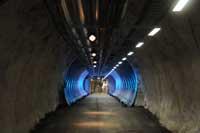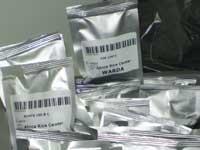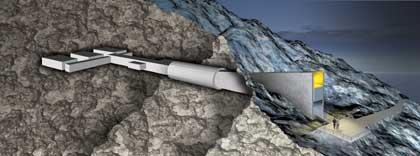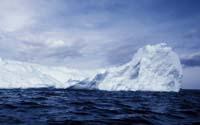The effort to preserve the seeds of disasters
2008/04/06 Lakar Iraizoz, Oihane - Elhuyar Zientzia

The deposit was made inside an icy mountain of this island, formed by three rooms at the end of a tunnel that penetrates 125 meters inside the mountain. Inside, farmers around the world will retain seed samples from major cultivated species and varieties, such as rice, corn, wheat or sorghum. In total, the warehouse can store 4.5 million seed samples and each sample can have hundreds of seeds.
The objective of this project is to maintain the diversity of species and varieties used in agriculture, since it is essential to have minimal genetic diversity in order to maintain the crops that are currently the main source of food. This aims to ensure a way to restart agriculture in a given place or around the world if a catastrophe occurs.

It has been made in an area near the North Pole, which ensures that the reservoir will have an ice layer that never melts (called permafrost). Thus, if the seed storage system fails under certain temperature and humidity conditions, it would not be at risk of them being lost, since the ice itself would maintain the necessary temperature. They will be stored at 18-20 degrees below zero and the degree of humidity will also be very low to ensure that the metabolic activity of the seeds is low.
When the metabolism is slowed down, the seeds become dormant, do not germinate, do not age, do not die... that is, they remain much longer than in normal conditions. Placed in the necessary conditions to germinate at the time of use, the seeds are able to restart the metabolism they had attenuated.
A project that does not satisfy everyone

However, this action, apparently without a dark side, has some drawbacks. For example, they have assumed that they will keep the seeds in good condition and, if necessary, they will be valid when they come out of them. But they have not shown it at all.
It is not the first seed store in the world, there are about 1,500, and it has occurred on several occasions that thousands of seeds have died while they were kept; many others have been unused for not handling them properly, and seeds that have lost their special characteristics when mixed with the genes of other seeds in recovery or reproduction are unquantifiable.
In addition, when conducting the feasibility study of the project, it was commented that on the island of Svalbard there were no volcanoes or major earthquake activities. A few days after its inauguration, there was the most violent earthquake in Norwegian history and the epicenter was Svalbard himself.
Moreover, no person can access or use these reserved seeds. It can only be done by members of certain entities and not by anyone who needs to grow at any given time. In addition, the last responsible of the warehouse is the Norwegian government. Today this government is considered correct and reliable, but it cannot be said if it will change.
That is, this project is not a panacea, it is not a remedy that will save humanity. However, it cannot be said to be absurd, it is not bad that there is a way that can help combat a catastrophe. You have to take this kind of news wisely, it is the best option.
Published in 7K.

Gai honi buruzko eduki gehiago
Elhuyarrek garatutako teknologia






